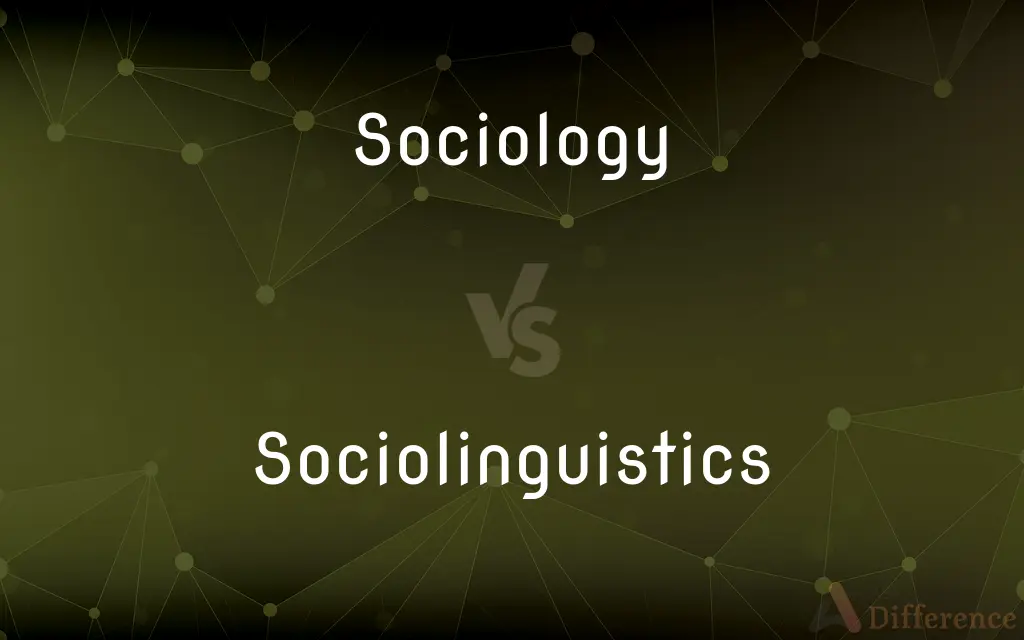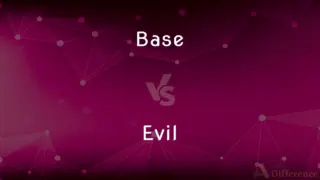Sociology vs. Sociolinguistics — What's the Difference?
Edited by Tayyaba Rehman — By Fiza Rafique — Updated on March 26, 2024
Sociology studies human society and behavior, while sociolinguistics examines language's social functions and effects.

Difference Between Sociology and Sociolinguistics
Table of Contents
ADVERTISEMENT
Key Differences
Sociology is the study of human social behavior, social groups, and societies, focusing on understanding the structures, dynamics, and functioning of human society as a whole. It explores various aspects of social life, including family, religion, education, politics, and economy, aiming to understand how human actions and consciousness both shape and are shaped by surrounding cultural and social structures. Sociolinguistics, on the other hand, is a branch of linguistics that investigates the ways language is influenced by social factors, including regional, class, and ethnic dialects, as well as the social functions of language, such as identity formation, social stratification, and power dynamics. It examines how variations in language use among different social groups signal identity and social relationships, and how language itself can influence societal structures.
While sociology provides a broad analysis of societies and the social interactions within, sociolinguistics narrows down the focus to language as a pivotal element of social interaction. For example, sociology might explore the role of social institutions in shaping individual behavior, whereas sociolinguistics would delve into how language reflects and reinforces social divisions, such as class distinctions or gender roles.
Sociologists employ a variety of methods to analyze social phenomena, including surveys, interviews, observation, and historical analysis, aiming to build theories that explain social patterns and can guide social policy. Sociolinguists, while also using some of these methods, often focus on qualitative analyses of speech patterns, language usage, and communication practices to understand the interaction between language and society.
Both disciplines, despite their different focuses, intersect in the realm of understanding human behavior within a social context. Sociology's broad scope provides a framework for understanding the structural aspects of society that influence behavior, while sociolinguistics offers insight into the nuanced ways that language acts as a medium through which social relations are negotiated and expressed.
Comparison Chart
Definition
Study of human societies, their interactions, and structures.
Study of language's social functions and variations.
ADVERTISEMENT
Focus
Social behavior, groups, and institutions.
Language use and its social implications.
Methods
Surveys, interviews, observation, historical analysis.
Qualitative analysis of speech, language patterns.
Key Concerns
Social structures, dynamics, and changes.
Language variation, identity, power in social contexts.
Intersection with Other Fields
Psychology, anthropology, economics.
Linguistics, anthropology, psychology.
Compare with Definitions
Sociology
Study of social structures and relationships.
Sociology examines how institutions like family and education shape society.
Sociolinguistics
Studies language's role in identity formation.
Research in sociolinguistics explores how language use signifies group membership.
Sociology
Aims to understand and improve society.
Sociology research can inform policies to address social inequalities.
Sociolinguistics
Examines power dynamics through language.
Sociolinguists analyze how language can perpetuate social inequalities.
Sociology
Employs diverse research methods.
Sociological studies often use surveys to collect data on social attitudes.
Sociolinguistics
Analyzes language in social contexts.
Sociolinguistics investigates how dialects vary across social classes.
Sociology
Focuses on societal behavior and dynamics.
Sociologists research the impact of social norms on individual behavior.
Sociolinguistics
Incorporates interdisciplinary approaches.
Sociolinguistic research often draws on theories from anthropology and psychology.
Sociology
Explores the role of culture in social life.
Sociologists study how cultural values influence social interactions.
Sociolinguistics
Focuses on language variation and change.
Sociolinguistic studies examine how languages evolve within social groups.
Sociology
Sociology is a social science that focuses on society, human social behaviour, patterns of social relationships, social interaction, and aspects of culture associated with everyday life. It uses various methods of empirical investigation and critical analysis to develop a body of knowledge about social order and social change.
Sociolinguistics
Sociolinguistics is the descriptive study of the effect of any and all aspects of society, including cultural norms, expectations, and context, on the way language is used, and society's effect on language. It differs from sociology of language, which focuses on the effect of language on society.
Sociology
The study of human social behavior, especially the study of the origins, organization, institutions, and development of human society.
Sociolinguistics
The study of language and linguistic behavior as influenced by social and cultural factors.
Sociology
Analysis of a social institution or societal segment as a self-contained entity or in relation to society as a whole.
Sociolinguistics
(linguistics) The study of social and cultural effects on language and vice-versa.
Sociology
A social science that studies society, human social interaction, patterns of social relationships, and the interactions of culture. Through both theory and applied research, it engages subject matters across a range of microanalysis, mesoanalysis, and macroanalysis.
Sociolinguistics
The study of language in relation to its sociocultural context
Sociology
That branch of philosophy which treats of the constitution, phenomena, and development of human society; social science.
Sociology
The study and classification of human societies
Common Curiosities
What is sociolinguistics?
Sociolinguistics is the study of how language is influenced by and reflects social structures and practices.
How do sociology and sociolinguistics differ?
Sociology focuses on social behaviors and structures, while sociolinguistics centers on language's role in society.
What is sociology?
Sociology is the study of human societies, their structures, and the interactions within them.
What kind of topics do sociolinguists study?
They study topics like dialect variation, language and identity, language in media, and language policies.
How are sociology and sociolinguistics related?
Both study social aspects of human life, with sociolinguistics focusing specifically on language within social contexts.
Can sociolinguistics be considered a part of sociology?
While sociolinguistics is a branch of linguistics, it intersects with sociology through its focus on social aspects of language.
Why is sociology important?
Sociology helps us understand the social forces that shape our lives, behaviors, and society.
How do sociologists conduct research?
Sociologists use various methods, including surveys, interviews, and observation, to study social phenomena.
What societal issues can sociology help address?
Sociology can inform policies on issues like inequality, education, and health care.
Why is sociolinguistics important?
Sociolinguistics provides insights into how language reflects and shapes social identities and structures.
What is a common research method in sociolinguistics?
Sociolinguists often conduct qualitative analyses of spoken language to understand social patterns in language use.
How does sociolinguistics intersect with psychology?
It intersects in studying how language affects and reflects psychological aspects of identity and group dynamics.
Can sociolinguistic research influence language teaching?
Yes, it can inform teaching practices by highlighting the importance of cultural and social contexts in language learning.
What role does culture play in sociology?
Culture is central to sociology as it influences social behavior, values, and norms.
How does language variation relate to social inequality?
Language variation can reflect and perpetuate social divisions, such as class or racial inequalities.
Share Your Discovery

Previous Comparison
Inquiry vs. Probe
Next Comparison
Base vs. EvilAuthor Spotlight
Written by
Fiza RafiqueFiza Rafique is a skilled content writer at AskDifference.com, where she meticulously refines and enhances written pieces. Drawing from her vast editorial expertise, Fiza ensures clarity, accuracy, and precision in every article. Passionate about language, she continually seeks to elevate the quality of content for readers worldwide.
Edited by
Tayyaba RehmanTayyaba Rehman is a distinguished writer, currently serving as a primary contributor to askdifference.com. As a researcher in semantics and etymology, Tayyaba's passion for the complexity of languages and their distinctions has found a perfect home on the platform. Tayyaba delves into the intricacies of language, distinguishing between commonly confused words and phrases, thereby providing clarity for readers worldwide.













































